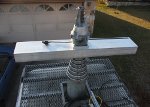|
I just received a brand new WRT54GL from Linksys ($50) that I'll be converting over, and I'd like to add an external unit at the shack too. From what I've been reading, it looks like one of the Ubiquiti systems would be the best way to go, as they are supported with the new firmware.
What is the best Ubiquiti unit to purchase? That is, which one has the best performance?
I've seen the UBNT.com specs on the Bullet M2 HP. It looks like the easiest to attach to the Omni directional 15 dBi antenna I'm looking at. But the specs I saw at ubnt.com seem to indicate it has lower receiver sensitivity at the lower data rates than their other models.
Is the Bullet less sensitive than the others, or is it just the spec sheet that is worded differently?
Has anyone used the Bullet, and what was their opinion of its performance?
And for those who may have other Ubiquiti models, what was their experience with it, especially the sensitivity?
Jerry K6ANI
|
